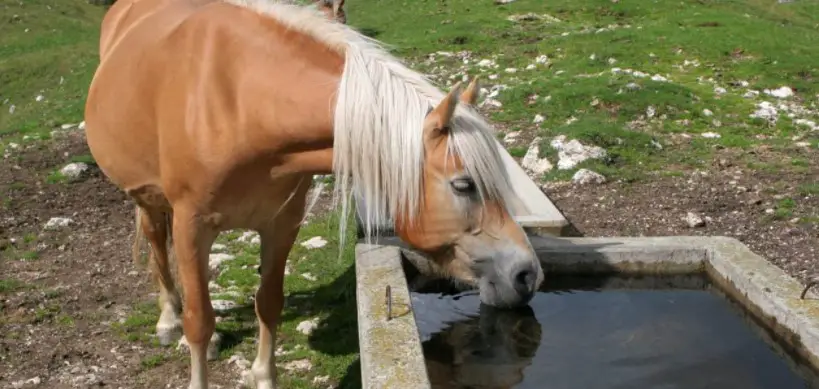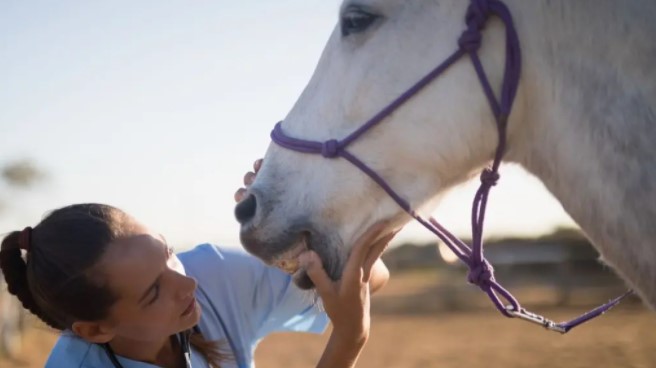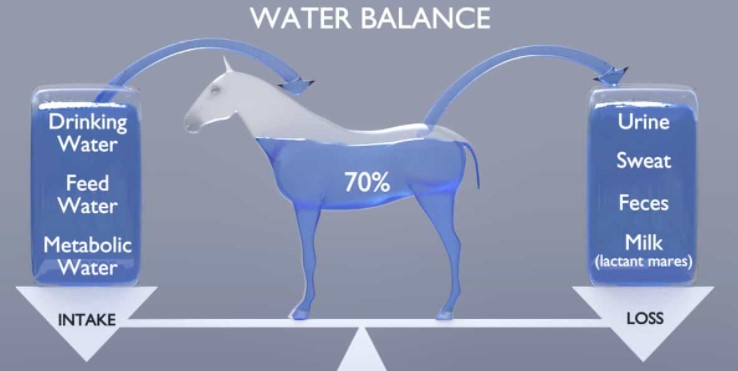How much water does a horse drink a day, you ask? Water is life. Therefore, humans and animals need to pay attention to the quality and amount of water they consume daily. And your horse is not to be left out.
You probably wonder if your horse consumes too little or too much water every day. Or maybe you want to know just how much water to give your horse and not have to worry about dehydration. Tag along to find everything you need to know about the right amount of water your horse needs to keep going strong.
The Right Amount of Water for Your Horse
Most horses require between 5 to 10 gallons of water daily. Although, this may vary in horses and seasons. Studies have proven that horses need water more than they need food. A horse can survive up to 25 days without food but can last only six days without water. A horse also loses its appetite to eat within the first two days of lacking water.

Water intake varies according to season. The availability of water differs in different seasons of the year. During winter, animals get less thirsty than in summer, so their water consumption decreases. But that does not mean that they don’t dehydrate in winter.
The various seasons also determine how horses are used and expended, affecting their water consumption. Horses are usually busier during the summer than in the winter. During summer, horse owners exert their horses for riding, games, sports, farming, and ranching. Consequently, they drink more water at these times. Many of these activities don’t happen in winter. After all, not many people are particularly enthusiastic about going horseback riding in a snowstorm. As a result, horses get more rest and consume less water.
What Happens if Your Horse Gets Too Little Water?
Without taking the right amount of water, your horse faces the risk of dehydration. Dehydration in horses may eventually lead to kidney failure and death if you don’t attend to them immediately.
You should begin to pay attention to your horse if it consumes less water than expected. Diseases and illnesses such as diarrhea and kidney failure may lead to loss of water which requires immediate replenishing to keep your horse up and running.
The best way to ensure that your horse is safe from dehydration is to provide unlimited access to fresh water at all times. But if, for some reason, your horse does not have access to water or refuses to drink for up to two days, it is better to seek veterinary help.
How to Know Your Horse Is Dehydrated
There are sure signs to indicate that your horse is not getting enough water. You can observe symptoms such as sunken eyes or dullness, dry mouth, drawn-up flanks, lethargy, dry skin, depression, and excessively thick saliva. You can also check for dehydration by collecting blood samples and checking if there is a high protein level in the blood.

A simple skin pinching test can also tell if your horse is dehydrated or not. When you pinch a fold of your horse’s skin and release it, the skin should return to its position immediately. But if, after releasing it, the skin does not go back to its natural place for up to three seconds, you can tell that the horse is dehydrated. The longer the skin fold remains, the more severe the dehydration is. Once you find that the dehydration is severe, contact a veterinarian.
How Much Water Is Too Much for a Horse?
While your horse can drink too little water, it is equally likely to consume too much. Excessive water consumption in horses is a symptom of illnesses such as pituitary pars intermedia dysfunction (PPID), also called Equine Cushing’s disease, leading to polydipsia, that is, excessive thirst.
Usually, you don’t need to worry about your horse drinking too much water if it’s healthy. The main concern is if it drinks too little or doesn’t drink at all. Horses don’t drink more than their capacity, even if you make excess water available.
How to Ensure Your Horse Has the Right Amount of Water

Provide Free-Flowing Water Always
Since horses don’t usually drink more than they require, ensuring that water is always available is safer. It doesn’t hurt to have more than needed, but a water shortage can have adverse effects you want to avoid.
Use Water Heaters
Horses love lukewarm water, especially when it’s cold. Keeping your horse indoors and warm can help them drink more if you can’t provide warm water.
Measure Water Intake
Keep tabs on how much water your horse drinks daily and make enough water available. A flow meter comes in handy here. But if you can’t get that, a simple bucket will be fine. A conscious effort to measure how much your horse drinks can help you determine how much water to make available.
Test for Dehydration in Your Horse
As mentioned earlier, you can check if your horse is dehydrated or not. Knowing how to check for dehydration can save our horse from impending peril. A skin pinch can do the trick. You can also seek veterinary help for a more proper test.
Use Electrolytes in Water
Electrolytes can stabilize your horse’s water intake and help it stay hydrated. Make sure to provide quality electrolytes in the water supply.
Wrap Up
Water consumption for horses can vary by horse, season, and weather. But health issues can also affect your horse’s water consumption. While a horse can take up to 10 gallons of water daily, you should pay close attention to the quantity and other factors determining how much your horse drinks. You should closely monitor a change in your horse’s drinking habits and investigate to ascertain that all is fine.
